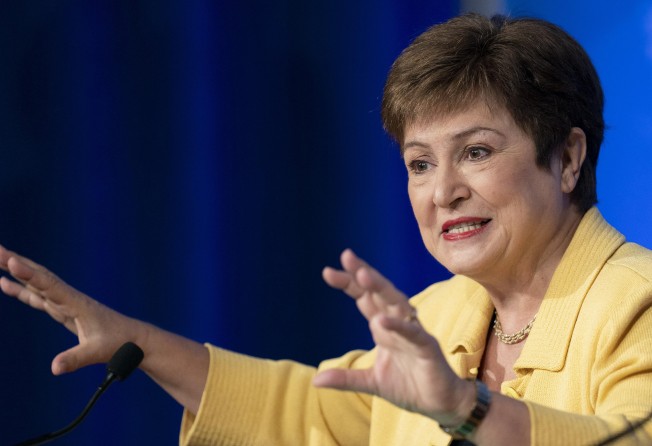Coronavirus: IMF, WHO say no trade-off between saving lives and livelihoods
- Getting the coronavirus under control is a prerequisite to saving the economy, IMF and WHO say
- Critical that policymakers, especially in developing economies, prioritise public health spending in addition to economic support

The International Monetary Fund and the World Health Organisation have urged political leaders, especially in emerging markets and developing economies, to prioritise public health expenditure as saving lives and protecting the economy go “hand in hand”.
“At face value there is a trade-off to make: either save lives or save livelihoods. This is a false dilemma – getting the virus under control is, if anything, a prerequisite to saving livelihoods,” International Monetary Fund (IMF) managing director Kristalina Georgieva and World Health Organisation (WHO) director general Tedros Adhanom Ghebreyesus said in a joint statement last week.
As the world responds to Covid-19, economic activity is plunging as measures to contain the virus shut face-to-face human activity, affect workers and supply chains, drag down spending and tighten financial conditions – all with cross-border spillovers.
Georgieva and Ghebreyesus said it was “critical” governments pay salaries for medical staff, buy protective equipment for frontline workers and carry out public awareness campaigns to protect people from the pandemic.
“In far too many places health systems are unprepared for an onslaught of Covid-19 patients and it is paramount to give them a boost,” Georgieva and Ghebreyesus said.
“And this can and must go together with support for economy-wide priorities required to reduce unemployment, minimise bankruptcies and, over time, ensure recovery,” they said in the article published by Britain’s Daily Telegraph.
Health spending comes in addition – not as a substitute – to providing targeted economic support to most-affected households and firms, they added.
Since Covid-19 started spreading across the world, a slew of multilateral institutions have pledged billions of dollars in emergency help for the global economy to deal with the crisis.
The IMF said it doubled its dedicated funding capacity from US$50 billion up to US$100 billion. The World Bank last week approved some 25 health sector emergency loans for 25 countries, amounting to US$1.9 billion.
The Asian Development Bank, the International Finance Corporation and the Asian Infrastructure Investment Bank have put together US$6.5 billion, US$8 billion and US$5 billion packages, respectively.
Georgieva and Ghebreyesus said that countries receiving the financial support should place health expenditure at the top of the priority list even if their public budgets are severely constrained.
The WHO could help in vital areas for coordination such as ensuring the efficient and equitable supply of medical goods to those in need by easing advance purchase agreements, they said.
The WHO was also working with other international organisations to ensure supply chains were functioning and aggregate demand to purchase medical supplies in bulk.
“Fighting the pandemic is a necessity for the economy to rebound,” Georgieva and Ghebreyesus said. “As we all work together, with little time and finite resources, it is essential that we focus on the right priorities to save lives and livelihoods.”
Sign up now and get a 10% discount (original price US$400) off the China AI Report 2020 by SCMP Research. Learn about the AI ambitions of Alibaba, Baidu & JD.com through our in-depth case studies, and explore new applications of AI across industries. The report also includes exclusive access to webinars to interact with C-level executives from leading China AI companies (via live Q&A sessions). Offer valid until 31 May 2020.